-
AFTERSUN (Charlotte Wells 2022)
CHARLOTTE WELLS: AFTERSUN (2022) - NYFF
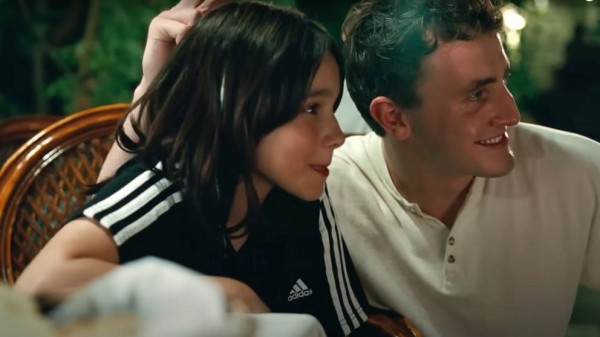
FRANKIE CORIO AND PAUL MESCAL IN AFTERSUN
An ephemeral, sad, and somewhat indigestible masterpiece
A.O. Scott of the New York Times writes in his review of Wells' debut feature that she is "very nearly reinventing the language of film." Yes, as all the critics say, this is a recreation of an eleven-year-old Scottish girl named Sophie's summer vacation with her young father twenty years earlier at a bargain Turkish seacoast resort, framed by brief images of the adult version of this girl, who glimpses video images they shot then. (The adult Sophie is Celia Rowlson-Hall; the much more lively and often-seen young Sophie is Frankie Corio. Her young dad, Calum, is Paul Mescal.) Yes, Mescal and Corio are fresh and amazing together. But the strongest impression Aftersun produces is its different, startlingly vivid, abrupt, staccato cinematic language (of most of the footage). Gregory Oke's close, intimate, angular camera is akin to Agnès Godard's for Claire Denis, but AFtersun has its own way of visiting moments, then cutting away from them. Wells has her own way of telling a story.
AS Mike D'Angelo wrote in a private subscriber review that's positive, yet lukewarm, the film is "hyper-specific in detail but largely uneventful." He goes on to say Wells is "seeking to evoke rather than to dramatize," which is curiously imprecise - though "evoke" and "dramatize" don't do justice here. The effect is of vividly recalled instinctive memories, so close to the unconscious workings of the brain words like "story," "evoke," or "dramatize" are irrelevant. We can now quote the other half of A.O. Scott's sentence, "unlocking the medium’s often dormant potential to disclose inner worlds of consciousness and feeling."
At the same time, as we watch we subconsciously form in our mind a conventional movie about that familiar theme, a preteen's summer vacation, and scenes of a father and daughter. Thus we also have to come to terms with an idea expressed by Elena Lazic in Playlist: "Bold acrobatics in editing and ambitious creative choices," she says, "feel all the more superfluous next to Mescal's effortless charisma." One can understand how someone would say this. Corio and Mescal play wonderfully together, and they might easily impress in a flatter, more conventional film. But the style of the film and the performances are not at odds with - they enhance one another, producing a kind of double whammy.
Still, at first you may like me be fighting what you're seeing on screen. Editing styles are staccato these days, but Wells seems much of the time to refuse to follow through on anything. One may see this as memory's revisiting of sense impressions, with no need for logic or narrative connections. Aftersun, whose title refers to some skin product, threads through dozens and dozens of details, a sauna, a mud bath, a lonely karaoke singalong by the girl, her many interactions with other kids, scuba diving, pool playing (Sophie is good at pool, and she is a bold, adventurous girl, ready to plunge into adolescence) a swimming pool, drinks, dinners, a rug shop, the bedroom with one big and one tiny bed (because twin beds were not provided), and on and on and on and on, and lots of precisely remembered late-nineties ephemera, including multiple half-forgotten or dearly remembered pop songs (Justin Chang says Aftersun has "an unerring musical ear for its moment") for viewers for whom this was the most intense of remembered eras.
But this is quintessentially the kind of film one only puts together later. Its vividness almost chokes you and doesn't let you think. It glimpses Calum's unhappiness. (Some say Mescal isn't up to the subtlety required to convey this mysteriously though if so, why does everybody get it? However having him alone, from behind, in a long miserable wail, seems perhaps a tad obvious: not everything in this youthful, personal, "emotionally autobiographical" first film is perfect nor need it be.) It's only later, if the film works right for you, that the sadness, the "overwhelming emotional force" (as Justin Chang puts it) starts to sink in. See Jesse Hassenger in Paste Magazine: "In its gentle, modest way, Aftersun might well break your heart." Details are left mysterious, but a final sequence, one of a number of imaginary or imaginatively embroidered moments, is a shocker, telegraphing the finality, the awareness that this dad whom his young daughter didn't see very often, because she lived with her mother in Scotland and he lived in London, may never have been seen again. Probably the strongest emotion we take away from a movie is sadness, and that sadness at its best and most effective is a gathering of emotion that builds in the memory on the way home or hours later. AFtersun is a somewhat indigestible and also ephemeral little masterpiece, and one of the best and saddest films of the year.
Aftersun, 96 mins., debuted in International Critics' Week at Cannes May 21, 2022. It showed at many subsequent international festivals; 32 are listed on IMDb, including Edinburgh, Telluride, Toronto, and New York. US limited release from Oct. 21, 2022. Metacritic rating 95%.
-
DESCENDANT (Margaret Brown 2022)
MARGARET BROWN: DESCENDANT (2022)
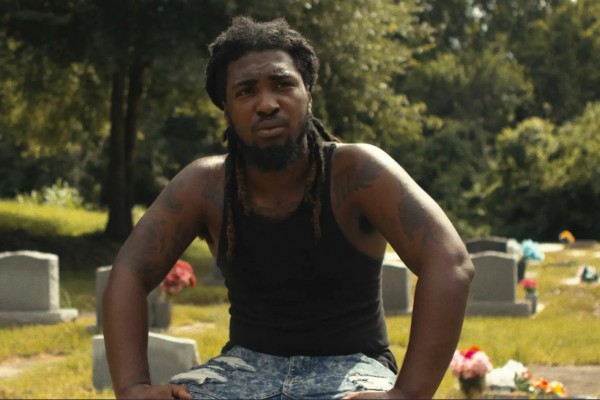
EMMETT LEWIS IN DESCENDANT
People and a place and the indelible scar of enslavement
The power and deep message of Descendant is all in the details, which are a gradual accumulation of moments whose collective import is much more than any one of them or any simple statement, any explanation. Early on Kern Jackson, of the University of South Alabama, says his preference is for messy data and messy history, not the neatly worked out and organized kind. This expresses the spirit of Descendant too, because here things, as suggested, gradually sift out, as if by themselves. We do our own thinking and above all out own feeling, through the people, whom we experience more powerfully thanks to the warm, present cinematography of Zac Manuel and Justin Zweifach.
Above all this is a film about place, about uncovering secrets, and about feeling roots. One senses it is a great film, though it's hard to say how and why it gains that status. You are advised to read the Rolling Stone review by K. Austin Collins, who best elucidates the film's original insight and formal invention. Collins starts with a jaw-dropping drone shot that doesn't come till midway in the film: he understands how Brown's remarkable process is one of discovery arrived at crab-wise, not of declaration - and that, though it arrives to catch us from behind, as Descendant becomes a documentary about a place it also becomes a study in environmental justice , and Collins co-reviews it with the Indian documentary about bad air and saving birds, Shaunak Sen’s All That Breathes. We discover now, at midpoint, that this little compound of tranquil greenery and empty spaces that is Africatown, thanks to lax zoning laws controlled like the local politics by descendants of enslavers, is surrounded with heavy-polluting industry and provided the descendants with a legacy of cancer.
Descendant is about the hidden in plain sight history of enslavement. But it's also about how places don't change. And what's good about that is it means people don't forget. The descendants of the people brought illegally from Benin/Dahomey in 1860 are still here, and so are the descendants of the people who brought them.
Doing that had been illegal since 1808 though owning enslaved people was still allowed in the US until 1865. This is a weird discovery for most of us, perhaps, in itself. The Clotilda cargo people from Dahomey therefore, after all the trauma and the loss of a culture, were only enslaved for five years. When they were released, they were sold some lousy land to have property of their own. The remnant of consolidation of that is Africatown. It was lousy then and it's lousy now, even lousier, a resident explains, with a highway running through where when he was growing up there was a quiet street with shops. Perhaps if it had prospered there would have been a massacre, like the Black Wall Street one in Tulsa in 1921.
But the place arrives to us by indirection. The focus here is oh the Clotilda and its history. Timothy Meaher, who apparently arranged the voyage of the Clotilda with Captain William Foster, had him burn the vessel to hide what had been done. The thread that runs through the pleasingly meandering line of Descendant is the search for the real underwater traces of this last slave ship, pursued particularly by an articulate diver and archaeologist, Kamau Sadiki, who is with the Smithsonian Slave Wrecks Project and an organizer and also an instructor of Diving With A Purpose (DWP), an international organization committed to resurrecting the stories of slave shipwrecks from the bottom of the sea through underwater archaeology documentation - and also teaching young Black kids to swim, as we see here.
The remnants of the Clotilda are found. This is an event that changes everything and changes nothing.
As we meet descendants of the Clotilda's original cargo, we learn they all know about this. The enslaved people were forbidden to speak of it, but the knowledge was variously passed down by oral transmission through the generations - knowledge dramatized in the film by readings by descendants from a book repressed, or shut away, for nearly a hundred years, Zora Neale Hurston’s Barracoon: The Story of the Last “Black Cargo.” She is a figure of African American history herself, who wrote the book from talking with t Cudjo Lewis, a last living survivor of the Clotilda journey.
We meet his young descendant Emmett Lewis, a sturdy, folky-spoken and incredibly charismatic young man with long dreadlocks who tells how an elder told him about the history as he lingered a lot in the burial ground with many of the community's tombstones and memories where he learned to listen to the ancestors.
The place is Africatown, known also as Plateau, just north of downtown Mobile, Alabama. The descendants of the people brought on the Clotilda are there, and nearby are the descendants of the criminal white men who connived to bring the prisoners from Dahomey, 110 of them, held for three weeks in the swamps before they were distributed to their three different "owners." We meet both, though we spend most of the time with the Black people, and also with others, Black and White, whose interest is in the history of this event and place.
This may after all be a film even more about people more than about place, but they seem inseparable. Director Margaret Brown follows various people around, whose vernacular eloquence impresses in various ways. One young woman, Jocelyn Davis, impresses with her alertness and openness. After the remnants of the Clotilda have been found and she has viewed a large realistic reconstruction of it a and wept, and we have wept with her, she says she doesn't know what is coming next, but she is excited and ready. Emmett Lewis goes to visit a restored plantation house of the slave owners, a beautiful place, and yet, as he says, evil, and that sequence also is one, of many, that made my toes curl, which is what happens when something is too deep for tears. What a crash course in all that the right wing wants to expunge from America's textbooks. An important film, and a cunningly made one in a great documentary tradition of finding and showing.
Descendant, 109 mins., debuted at Sundance Jan. 2022, showing also in festivals at SXSW, CPH DOX (Copenhagen), Boston, Birmingham, Camden, and in the Main Slate of the New York Film Festival. A Netflix film. Metacritic rating 87%.
Last edited by Chris Knipp; 09-06-2023 at 12:50 PM.
-
CORSAGE (Marie Kreutzer 2022)
MARIE KREUTZER: CORSAGE (2022)
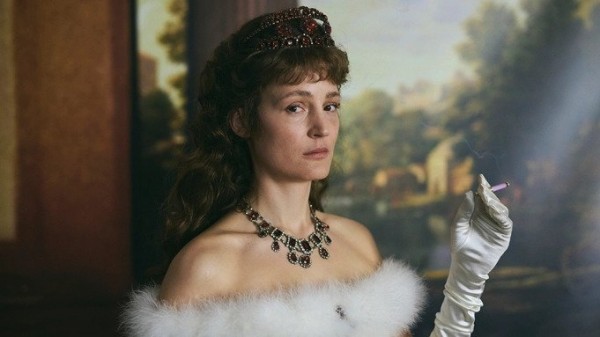
VICKY KRIEPS IN CORSAGE
A love-it-or-hate-it radicalized portrait of the Empress of Austria
Corsage, whose title refers to corsets not flowers, is a radicalized portrait - it is full of intentional anachronisms from language to dress to diegetic introductions of recent pop songs - of the empress of Austria-Hungary and is played, stunningly, by the actress Vicky Krieps. It's a mixed bag, beautiful, impressively staged, intentionally off-putting. It will be remembered, by some with distaste, by others with admiration. It has been a festival darling (opening in Un Certain Regard at Cannes), much awarded. If you pay close attention, whether or not you know the history it plays with rather freely, you're likely to come away confused. It's above all to b e watched for the full-bore mise-en-scène and for a major performance by the chilly, striking Luxembourgish-German multilingual actress. She gets to speak German, French, English, and Hungarian, to strike a hundred poses and wear a hundred beautiful costumes. The film belongs to her. To say this character is a crazy prima donna is an understatement.
The time is Vienna in 1877, Elisabeth is becoming 40 at Christmas and it's a turning point. She's not the young royal star and influencer she has been since her fabled marriage-for-love with Emperor Franz Joseph (Florian Teichtmeister). Somebody points out women in the kingdom mostly die at this age. Interesting point: she's afraid of having children now and rules out sex with Franz Joseph: in one scene they start to make out and then masturbate together. But Elizabeth is massively energetic, as well as antsy and dissatisfied.
There is not much plot, or effort to give the film one by the filmmakers. Cutting off all her hair looms large. There is a rapid, almost whiplash-inducing succession of quick tableaux as the empress indulges a Spencer-like series of diet torments, riding exploits (including a fall that to her devastation leads to the death of her beloved horse), affair (flirtatious or outright sexual we don't know-Kreutzer is stingy with sensuous details) with her British riding instructor. Bay Middleton (Colin Morgan). The opening scene shows her holding her. breath under water in a tureen-like metal bath while maids time her . She also lingers in very hot water and she has a penchant for visiting insane asylums (it's hinted she feels kinship with the lunitics, and she lies down to smoke a long pink cigarette with an attractive young one). A new cure for madness is hot baths, and we see a whole row of tubs on one asylum visit.
It's impossible to list all the activities we see Elizabeth engaged, or indulged, in. She is most characdytreristically seen as a walk-out of state dinners or other affairs, a no-show at events; for her life, for her imperial responsabilities. Even as she is, we assume, still a rock star to her subjects, she turns away. Early on she says to her sister, her major confidante, "Let's go on a trip," when she has to be reminded Christmas is coming. She has children, a little girl and a grown-up boy. Both are disapproving of her antics: the little girl tells her she is the child. And this feels true. She is constantly wearing violet, passing out violet canies to inmates, smoking cigarettes with a flourish, being strapped into those titular corsets, never tight enough for her.
Corsage is very sure of itself. The enjoyable, hugely admiring Variety review of it by Jessica Kiang makes clear how its obstreperous defiance of norms (much like its subject's) defiantly, perhaps satisfyingly, sets it apart from the schmaltzy, popular celebrity portraits starring Romy Schneider and the new six-part Netflix series ("The Empress") that started this September. But this arbitrariness in flipping the historical rules it has followed so meticulously at times becomes unsteadying. One has to revel in the nutty ego games of the protagonist for their own sake to enjoy the film. But that is offset a bit, wouldn't you say, by the fact that this is a well-known historical figure at a much-documented time? This is a much more elaborate recreation of place and time than Larraín's Spencer, making its fantasy element harder to sink into.
One can praise the cinematography of Judith Kaufmann. Not so rue about the editing of Ulrike Kofler or the score of "Camille." Much else that's wonderful in the projection gets lost in the ego-shuffle. Even the Vienna Boys Choir is included. They sing as angelically as ever.
Corsage, 113 mins., debuted in Un Certain Regard at Cannes May 2022 (with the best performance award). It was included in dozens of other international festivals, including London, Toronto, and New York. Metacritic rating: 81%.
Last edited by Chris Knipp; 11-19-2022 at 03:51 PM.
-
A COUPLE (Frederick Wiseman 2022)
FREDERICK WISEMAN: A COUPLE (2022)
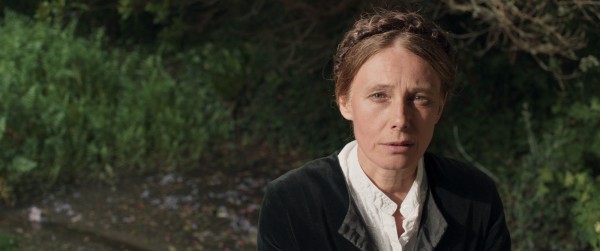
NATHALIE BOUTEFEU IN A COUPLE
A COUPLE (Frederick Wiseman) gets a 4/5 in Peter Bradshaw's Guardian review, which kindly summarized at Venice this fictionalized, dramatic feature film of only 64 minutes from the documentarian of normally epic length. Nathalie Boutefeu, also coauthor of the script, stars as the wife of Leo Tolstoy with "a series of yearning monologues" (as Bradshaw puts it) "which have been adapted from her diaries and letters." This is Wiseman's first narrative feature in 20 years. His last such, the 2002 film, was similar, from a Russian (or Yiddish-Ukrainian) source but spoken by a woman actress in French and an hour long. But it was a filming of his own Paris stage production of La dernière lettre. Both seem to reflect that though Wiseman is still listed on IMDb as a resident of Cambridge, Massachusetts, he resides in Paris. The new film was filmed in France, in French, in a privately owned seaside garden on the French island Belle-Île off the coast of Brittany.
A Couple is Tolstoy's wife Sophia Tolstaya speaking, and dramatizes excerpts from her journal. It is a kind of letter too, because it begins with actress Natalie Boutefou as Sophia, saying, "The first thing I feel like doing today is to write to you, Leo." She explains that they got into the habit of writing each other every day even though they lived in the same house. She goes on about how her husband, the great writer, crushed her with his power, oppressed her with his jealousy, embarrassed her in front of guests. How hard she worked, copying and recopying his manuscripts (she reportedly wrote out all of War and Peace two or three times).
The monologue addressed to Leo continues, with things he said in his diary, and more about their repressed, intense, frustrating relationship which demanded so much of her and gave so little back. More too about his neurotic fear of death. Then there are more general statements: "Even the most sincere and honest of us always wears a mask and hides what we are deep inside. . .Most people live as if they are blind. . .Life shrinks and dwindles." But she is still talking about Tolstoy. His being a creative giant made him a shrunken man, a twisted husband with not much left to give - who yet at times spoke of great love.
She describes a suicidal moment when she entered their freezing bath house and dreamed of getting sick and dying, leaving Leo to take care of the children in her place. She speaks of his infidelity, and how it changed their feelings toward each other, but then they make up and things are good for a long time.
This review of a marriage is intense, painful, partly beautiful, emotional, but also somehow abstract. One might like to hear from Leo - though she often quotes him here - speaking about this relationship for himself; but of course that also would not work because as she says at the outset, his power smothered and dominated him, and the need is for her to break free, even if she does so only to talk about nothing but him.
Nathalie Boutefeu is plain, but elegant. Wearing braided hair, she is dressed severely but handsomely in a white blouse and black velvet, sometimes a flowered shawl with a black field. There is a coolness but also a sweetness about her, restraint but also a smile in the eyes. She speaks softly and quietly. All her monologue is outdoors. Sometimes she sits or stands, sometimes she is is walking, by rocks, tide pools, bushes and grass. There are memorable closeups of termites swarming on a log and big ants, and beautiful blooming flowers. Breaks in the monologue are filled by acres of green, bramble or trees or great rocks, with crashing sea at the start.
It would not be an exaggeration to say this is a beautiful film, but its recollection-in-sadness mood isn' terribly moving. Bradshaw introduces this - rather badly titled - film as "a belletristic homage to the most famously unhappy marriage in literary history." He points out the setting is pure invention; the Tolstoy estate, Yasnaya Polnaya, was nowhere near the water. The situation is of a kind of sweet imprisonment, one might say. Not mentioned is the sweet trap of being married to one of the greatest writers in history, the reflected glory, despite the sometime psychological mistreatment. Because Tolstoy "at least sometimes" loved Sophia she was "doomed to bear the burden," Bradshaw puts it, "of looking after the house and grounds" (though surely there were caretakers to tend to the details of that), "seeing to their many children" (and while she seems to mention only two here, there were thirteen!), as well as "dealing with Tolstoy’s many guests and insufferable fan-worshipping admirers and acolytes, and of course, helping him with his work." But except for the caretaking and children and help with the work, Bradshaw is filling in details not specified here. As said, this is a film that's beautiful, sad, a little abstract. One sees the inexhaustible, now ninety-two-year-old Wiseman straining a bit to bring something to life when he is, at heart, the cool, meticulous observer - and that's a very different thing. Marshall Schaffer pointed out in Playlist that A Couple "never quite manages to transcend its origins as a precious pandemic project." No matter how beautiful it is, it remains static.
A Couple/Un couple, 64 mins., debuted at Venice Sept. 2, 2022, also showing at DMZ (South Korea) Sept. 25 and the NYFF Oct. 2. It opens Oct. 19 in France, and In the US released by Wiseman's signature Zipporah Films at Film Forum Nov.11. Metacritic rating 73.

NATHALIE BOUTEFEU IN A COUPLE
-
SHE SAID ( Maria Schrader 20220
MARIA SCHRADER: SHE SAID (2022)

CAREY MULLIGAN AND ZOE KAZAN IN SHE SAID
'Times' Harvey Weinstein investigation story feels flat
A two-woman reportorial team at The New York Times broke the October 2017 story about film producer and distributor Harvey Weinstein's three-decade history of sexual harassment and rape. Weinstein, head of Miramax and his own company, became gthe most notorious example of the abuse of women, particularly in Hollywood, which spearheaded the #MeToo movement that has altered the balance of power of the sexes. She Said is a journalistic procedural film in the manner of All the President's Men or Spotlight.. It is an essential story. Unfortunately, it winds up being a more dutiful and less exciting watch by a fair margin than those other films. As the Austin Chronicle review put it, She Said" is a respectful, serious-minded effort that works so hard not to sensationalize the material, it works against its dramatic impact."
This isn't the fault of the core cast of Carey Mulligan as the tough, elegant senior reporter Megan Twohey, Zoe Kazan as her eager, weepy ingenue partner Jodi Kantor, Patricia Clarkson as their suave senior supervisor Rebecca Corbett, or Andre Braugher as Dean Bequet, their forceful, confident boss. Their performances are fine. So are those of the numerous other actors playing secondary roles, especially the key ones of women abused by Weinstein, including one, Ashley Judd, who briefly plays herself.
The story's importance is hard to overstate. Not only was Weinstein a notorius, outrageous case, a flagrant, serial abuser, but he was a really important figure in the world of movies. Some of Mr. Weinstein’s films include Sex, Lies, and Videotape, Pulp Fiction (as well as other Tarantino films) and Good Will Hunting - and many of the notable films of the past thrity years; Forbes lists 81 Oscars his films won. She Said has been praised for not showing Weinsein doing his ugly business, though his modus operandi is frequently described. He had young female assistants. They were often thrilled to have this job, because they wanted a career in the film industry, and it put them close to one of the most famous and powerful figures in movies. It has since emerged, by the way, that Weinstein was as crude, crass, and manipulative in his handling of a lot of the films he distributed, especially Asian ones, as he was with his human victims, ruthlessly cutting and rearranging them sometimes so that they would be more mainstream or sell more tickets, in his belief. One should add that he was a big, physically imposing, ugly man. Sometimes one wishes this movie provided a more vivid sense of his physical presence, his bullying menace.
Weinstein routinely had these young women working for him report to posh hotel rooms he was staying in in New York or abroad. He would come to greet them wearing a bathrobe, force them to sit near him, appear semi-nude or naked, ask them to watch him shower, and persuade them to massage him and otherwise be intimate with him. This sometimes led to forced sexual intercourse. If the young woman fought, protested, or fled in tears, as they often did, he would threaten them to keep them quiet. He or his company paid millions, we learn to buy their silence, having them sign binding agreements never to speak of their experiences even to family members. When they fled from him, these young women were blocked from getting other work, left traumatized and robbed of their career hopes. The damage done was incalculable. Moreover, though this is only mentioned, it's reported that such behavior in some form or other was commonplace in the American movie industry. It's not over, and we can only guess to what extent the exposures and #MeToo have improved male behavior in the film industry and beyond.
Most of the time of She Said is spent following Megan and Jodi, who are shown to be mothers with husbands and children, as they go on numerous trips and make countless phone calls and interviews and known on doors to ferret out who Weinstein's victims were and contacting them and trying to persuade them to speak on the record. They also importantly deal with Weinstein's lawyer and accountant and persuade them to bend. The signature moments are ones in which Megan and Jodi slowly gain confidence, or the happy time when a witness changes her mind and promises to go on record. Endless effort, ultimately tiresome, is spent seeking to find out how many verifiable silence agreements Weinstein there had been and how much was paid out.
The story the Times published is long and detailed. If you read it you understand why the lengthy period of investigation depicted in the movie was necessary. If the movie drags, despite the significance of the subject matter, the causes are twofold. This story is a shocking and imortant one but it's not as complex as Watergate or sexual abuse among Catholic priests, but instead focuses on the repetitious behavior of a single man. One might contrast François Ozon's 2018 By the Grace of God/Grace à Dieu. By successively entering into the experiences of three very different men who all suffered sexual abuse by priests as boys, the film gives us a sense of exploring a whole range of society. Spotlight follows the work of multiple Boston Globe reporters discovering the abuse of multiple priests.
The other issue with She Said is simply the screenplay and the direction, which are equally flat and uninspired. (See Keith Watson's Slant review.). They make the action seem more repetitious than exciting. She Said winds up feeling dutiful. German director Maria Schrader's 2021 satirical sci-fi movie I'm Your Man was witty, thought-provoking, and enjoyable. She may have been rather out of her element here.
She Said, 129 mins., premiered Oct. 13, 2022 at the New York Film Festival, showing at 19 other mostly US and some international festivals listed on IMDb. Metacritic rating 73%. US release in theaters from Nov. 18, 2022.
Last edited by Chris Knipp; 11-24-2022 at 09:36 AM.
-
BONES AND ALL (Luca Guadagnino 2022)
LUCA GUADAGNINO: BONES AND ALL (2022)
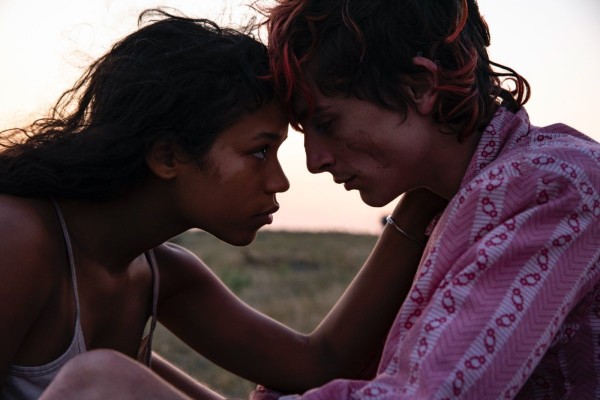
TAYLOR RUSSELL AND TIMOTHÉE CHALAMET IN BONES AND ALL
Almost enchanted, one still asks "Why?"
Luca Guadagnino's new film Bones and All is dangerous to describe because if it succeeds at all it's unclassifiable. The director here films a kind of teen romance road picture, featuring a girl, Maren (Taylor Russell) and a boy, Lee (Timothée Chalamet), who are cannibals. Fine young ones? I don't know. There is a big part of them that wants to be just people, though that of course is impossible. Their dilemma encourages us to identify or at least sympathize with them. Their world is in flux. They don't know who they are or where they're going from one minute to the next. The best aspect of this often disturbing and distasteful film is an authentic sense of danger and unpredictability, the excitement of youth at risk. If Guadagnino can keep the action on the screen feeling strange and unpredictable, it may feel real.
That said, it's disappointing that a major monkey wrench in the well oiled romance is the appearance before Maren and Lee even meet, but after Maren's father (André Holland) has skipped out on her leaving her, age eighteen now, to fend for herself, of Mark Rylance in full-bore character mode as folksy (but creepy) older cannibal Sully. Sully is explanatory. He informs the newly-on-her-own Maren they refer to themselves as "eaters," that the need will only grow as she ages; they can go for long periods without, but they will always need to dine again. He also points out that they can smell each other. Consuming a whole human "bones and all" is a special treat. He has his own rules. He does not kill, or he says not. Eaters do not eat eaters, or at least by his rules they don't.
Rylance is a great actor and delivering such conversation in cornpone tones must have been a pleasure for him, but it distances us, whereas Maren and Lee have their own specificity and, yes, humanness.
For followers of Guadagnino there are points of contact to begin with. Timothée Chalamet was the linchpin of the director's most appealing and successful film, Call Me by Your Name. There are a few brief but memorable moments involving Chloe Sevigny, as Maren's mother, whom she has never known, and now tracks down: Sevigny figures prominently in the director's engaging, enveloping one-season HBO series, "We Are Who We Are." It also seems as if Taylor Russell is akin somehow to Jordan Kristine Seamón as Caitlin in "We Are Who We Are," who enters into a sort-of-but-not teen romance in the series. Guadagninino again shows a penchant for teen experience, this time not misfit schoolkids, but a sort-of Bonnie and Clyde.
It might be tempting to say cannibalism is just incidental in Bones and All, or a stand-in for something else - being a misfit, addict, foreigner, gay - except for the considerable amount of gore we see in this film. In making the compulsive, bloody lust to consume human flesh and blood intense and vivid, the film stands with the best of them. It makes the ugly act more real. This in spite of the fact that, as David Rooney puts it in his Hollywood Reporter review, Guadagnino is "far less interested in the shock factor" than in "the poignant isolation of his young principal characters and the life raft they come to represent to one another..." That doesn't mean the shock factor isn't there. But our identification with the "poignant isolation," condemned to live wrong as dangerous, forbidden enfants maudits, a tragic and romantic situation we're rudely awakened from when a new scene of gore bursts with shock onto the screen. "Twilight" is one of the many implied references, but these rootless cannibals seem sadder than suburban middle class vampires whose pallor so much becomes them.
Taylor Russell is a new face and it's hard to define her or her character except to say she fits so seamlessly we accept her. The device is used of a cassette tape her father leaves her that plays through half the movie, where he describes their life together, how he protected her (running from one identity and location to the next like the revolutionary fugitive family in Lumeet's Running on Empty), but can't do it anymore.
Lee, Chalamet's character, comes with something of a family life, including a sister who reproaches him for too often being away. Chalamet is, to his advantage, deglamorized here. True, when the falling sunlight is at a good angle, his reddened hair is fluffed and his profile is turned the right way and the Trent Reznor and Atticus Ross score soars, he's a perfect gutter pretty boy. But dp Arseni Khachaturan's camera isn't always friendly to him, shows wrinkles and strain, his mouth is twisted, and Chalamet becomes the most interesting character he's ever played.
Many would agree with what A.O. Scott says in his New York Times review, that Bones and All is "a ragged hybrid of genres and styles, an elevated exploitation movie, a succession of moods." You might say that's always true when horror or genre are done well. The difference from some examples, like, say, Near Dark, is it all seems less a lark, and nothing is a laughing matter here.
Guadagnino takes himself very seriously, which may seem a bit much. But after being softened up by thoroughly loving Call Me by Your Name like almost everybody else, I became a fan binge-watching and binge-repeating the eight very rich hours of "We Are Who We Are." Those hours have showed how satisfyingly detailed and empathic this filmmaker's sense of a world can be and how much he cares. That explains how seriously he takes these young cannibals, and I thank him for that. I also became aware of his use of music. Music is so important in "We Are Who We Are" the whole final episode is devoted to Fraser and Caitlin's attending a concert by the composer of the series' score, Dev Hynes, aka Blood Orange. There are several splendid musical moments this time too, and the Reznor/Ross score is powerful without ever seeming to intrude.
It's also worth commenting how somehow it appears this movie effectively manages to use the environs of Cincinnati to create the feel of eight or ten different states, a brilliant stay-at-home road picture effect, with memorable seedy interiors by Khachaturan and the set dressers throughout. Guadagnino is fascinated with trailer park Americans - a tradition, like the trailer park RV vampire killers in Kathryn Bigelow's 1987 B picture classic Near Dark, which has been billed as a Western.
I still can't help asking: Why? But I think the answer is there somewhere. I ask that more pointedly for Claire Denis' Trouble Every Day, because this is a better movie, its principal characters easier to almost-like.
Bones and All, 130 minutes, debuted September 2, 2022 at Venice. It was shown also at Telluride, Zurich, Austin, Bergen, Vienna, Brisbane, São Paulo, Leiden, Taipei, Stockholm, and other international festivals. It was presented in the Spotlights section of the NYFF. Metacritic rating: 72%. Limited US theatrical release Nov. 18, 2022.
_________________________________
"Bones and All is a ragged hybrid of genres and styles, an elevated exploitation movie, a succession of moods — anxious, horny, dreamy, sad — in search of a metaphor. Or maybe the metaphor is obvious. Neither raw nor fully cooked, it might make you lose your appetite, but it’s more likely that you’ll still be hungry when it’s over." - A.O. Scott.
Last edited by Chris Knipp; 11-24-2022 at 02:48 AM.
-
THE NOVELIST'S FILM 소설가의 영화, (Hong Sang-soo 2022)
HONG SANG-SOO: THE NOVELIST'S FILM 2022)
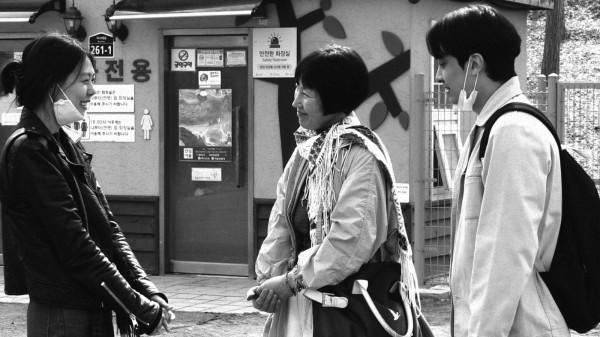
KIM MIN-HEE, LEE HYE-YOUNG, AND HA SEONG-GUK IN THE NOVELIST'S FILM
Turning to another medium in a dry spell
In this latest variation on his themes of revolving encounters, drinking and talking and self-reflective examinations of the creative life and the vagaries of relations between the sexes, Hong Sang-soo introduces Junhee (Lee Hyeyoung), a well known and once prolific woman novelist who has become unable to write. We find her arrived on a trip away from Seoul to a small town to visit a woman friend (Seo Young-hwa) who, unbeknownst to many, according to her, is now running a bookstore (also a cafe and local gathering place). She is herself a writer whose well seems to have run dry; in fact that seems to be why Junhee has come to seek her out. Here the novelist also encounters Gyeongwoo (Ha Seong-guk), a young film student who knows and admires her very much. She also, at a modern lookout tower, meets Hyojin (Kwon Haehyo), a director she seems not to think much of, who it turns out had intended to adapt one of her novels, till the project was squelched due to lack of funding. She is unimpressed.
After several chance meetings, Junhee winds up lunching with Kilsoo (Hong's muse and partner Kim Minhee), a well-known actress who claims to be fed up with the thespian life. Junhee has not met Kilsoo before but loves and admires her work, as Kilsoo loves and admires Juhhee's.
So it is that sitting there Junhee gets the idea of trying her hand at cinema, for the first time making a short film that she proposes will star Kilsoo, with the aid of Gyeongwoo, an idea to which Kilsoo somewhat tentatively agrees. It won’t be like other films. It will be the novelist’s film. Ir at least so runs the festival blurb: novelists have been known to dive into movie-making, but the idea may be new in Hong's world.
The action here, not for the first time in this director, is meandering and sociable. It involves people meeting old friends, or persons they have long admired, and finding ways to spend time with them in different groupings that fill up the whole day. Sociability that might seem more time-wasting for artistic people in dry spells, is seen here as necessary and restorative and leading to ideas. There is also a warm plug for the joys of reading, but only what one really likes. At a group drinking scene at the bookstore after Junhee has made friends with Kilsoo over a ramen lunch, the novelist finds herself next to a bewhiskered older poet, Mansoo (Gi Joo-bong), whom she used to drink with, too much, she thinks now, but he totally disagrees. (There is some cultural discomfort in hearing the way drinking is mindlessly extolled as a good in itself in Hong's films.) Everybody should drink a lot sometimes, says the washed up poet. Kilsoo drinks so much she falls asleep.
It appears the only character who is clearly not going through a creative dry period is the film student, Gyeongwoo - and maybe the bookseller's assistant, a shy young adept at sign language (Park Miso). Gyeongwoo however is a useful mechanism rather than one of the interesting, sympathized-with characters. There is a plethora of characters this time, but in exchange the chronology is more linear than usual except for a leap forward at the end with an excerpt from the completed short film.
Great admirers of Hong tend to like nearly everything he does and the New York Film Festival twice in a row has included two new Hong films in their annual Main Slate. But in this film the thrill is not as much there as in Hong at his best. Nonetheless the central idea is nice: a whole gathering of artistic types out of ideas or suffering creative blocks happens partly deliberately and partly by chance one day, with the result that two of them collaborate together with the essential help of a young man with a camera to make a short film, starring the actress, written and directed by the novelist.
This interesting but less that top-tier effort is marred by a repetitiousness in the dialogue in the way characters in various combinations fawn on each other, alternately gushing vague and sweeping compliments or giddily giving thanks for them. Could there not have been at least one character who is sarcastic or niggling with praise? Or are there bat squeaks of disapproval or jealousy lost in the subtitles?
One returns to a favorite idea expressed by the celebrated American abstract expressionist Robert Motherwell, that an artist's less successful works are necessary stepping stones to the good ones.
The Novelist's Film 소설가의 영화, debuted at the Berlinale Feb. 15, 2022, winning the second-place Silver Bear Grand Jury Prize, also showing in over two dozen other international festivals, including Taipei, Toronto, Busan and New York. French title: La Romancière, le film et le heureux hasard. Metacritic rating: 82%.
Last edited by Chris Knipp; 11-28-2022 at 11:34 PM.
 Posting Permissions
Posting Permissions
- You may not post new threads
- You may not post replies
- You may not post attachments
- You may not edit your posts
-
Forum Rules





 Reply With Quote
Reply With Quote







Bookmarks